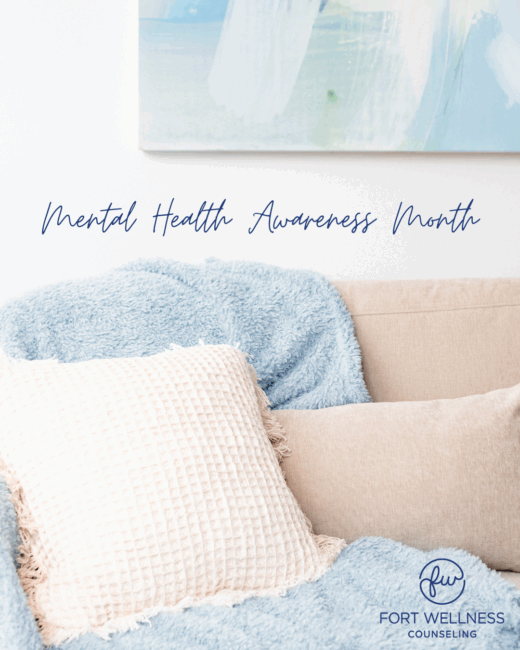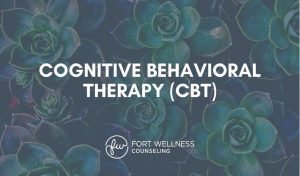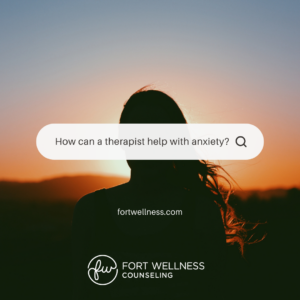Every May, Mental Health Awareness Month raises awareness and advocacy for people impacted by mental health challenges. For me, it’s more than just a calendar event—it’s a reminder of why I do this work.
Society once treated mental health with fear and shame. Some even believed evil spirits or cosmic forces caused mental illnesses. While these concepts may seem like ancient history, the stigma they created still lingers today. Misunderstandings and false ideas continue to cast shadows over conversations about mental wellbeing. While we have come a long way in normalizing mental health, we still have a long way to go.
The truth is that feelings of anxiety, loneliness, depression, stress, or burnout are not uncommon and not abnormal. These experiences are part of being human, and millions of people navigate similar challenges every day. Early intervention can make a significant difference when you recognize symptoms and overcome the misconceptions that might prevent you from seeking help.
During Mental Health Awareness Month, I want to share facts that shed light on today’s common mental health myths. By addressing these misconceptions directly, we can create space for more honest conversations and better support for everyone’s mental health journey.
10 Mental Health Myths and Facts
Understanding these can help you make better decisions about your wellbeing—and maybe even change how you think about mental health altogether.
Myth: Talking about mental health makes you feel worse.
Fact: Talking with others about mental health is part of reducing stigma and the start to the healing process. Reversely, ignoring concerns doesn’t fix or make them disappear, and can make you feel worse. Verbalizing feelings is often the first step to feeling better.
Myth: I can diagnose or treat myself using online information.
Fact: Be careful what you read or see online, especially from untrustworthy sources. That TikTok video diagnosing you with seven conditions in 60 seconds? Probably not the most reliable resource. Social media posts, while entertaining, aren’t substitutes for professional assessments.
Myth: Adolescents do not commonly have mental health problems.
Fact: Sure, teens have mood swings—one minute they’re dancing in their rooms, the next they’re dramatically sighing about homework. But don’t dismiss all emotional turbulence as “just a phase.” According to UCEF, 14% of the world’s adolescents experience mental health challenges. And it’s important to support them early. Karen Blandino and Hannah Causey are on our team over here, and both do great work with teenagers.
Myth: Mental health equates to weakness.
Fact: Mental health struggles aren’t about weakness or character flaws. Environmental factors, genetics, and other stressors also play a role. Just like we can’t see someone with the flu as weak, mental health challenges don’t define a person. And seeking help when struggling is a sign of resilience and strength. After all, it takes someone being courageous to admit they have something going on that they would like to get some support with.
Myth: Mental health problems last forever.
Fact: Therapy guides your brain to reframe ideas and shape new neurological pathways (neuronal plasticity) to combat mental health issues. Indeed, continually working in therapy can increase your brain’s capacity to adapt (and handle stressors). Therapy can help you learn how to reframe your mind and manage your emotions.
Myth: Only people with serious mental illness need therapy.
Fact: Therapy can be beneficial for truly anyone. And counseling doesn’t only treat severe conditions. Many find it helpful when struggling with daily life changes. We can all relate to dealing with complicated feelings about work and relationships. You also don’t have to have a mental health diagnosis in order to seek therapy. After all, a lot of my clients are high level business executives that need a 3rd party sounding board.
Myth: Seeking treatment means having to take medication.
Fact: Treatment for mental health is highly individualized. While medication can be effective for some, it’s not the only option. Patients often benefit most from a personalized combination of therapy, medication, lifestyle changes, and mindfulness practices. While our therapists are not qualified to make the determination on medications, we can let you know if it’s something worth talking to a psychiatrist about. Dr. Chelsea Angelocci is our Medical Director over here at Fort Wellness Counseling and she’s the owner of Centered Psychiatry and Wellness, and so we are happy to refer to her and other resources if psychiatry might be an avenue worth pursuing.
Myth: If I have to take medicine, it will make me feel unlike myself.
Fact: Medications are only for reducing symptoms and will not change who you are or your personality. Finding the proper medication can take time or involve trial and error. However, talking with your doctor is the best way to see what works for you. I see frequently where clients might have tried something 20 or 30 years ago and so now they are less receptive to the idea. Saying the medical community has come a long way in the last 20 or 30 years is an understatement to say the least.
Myth: Managing my emotions in the past proves I don’t need therapy now.
Fact: Overcoming adversity in adolescence without therapy does not mean you don’t need guidance or support now. In fact, experiencing numerous stressful situations early in life increases the chances of experiencing mental health challenges in adulthood.
Myth: If you have friends, there’s no need for a therapist.
Fact: Talking with a therapist is completely different from talking with friends (although both can be helpful). Nonetheless, an experienced therapist can offer professional advice and tools for improvement. Also, not everyone feels comfortable opening up to their closest circle – the anonymity of a therapist is a plus. The fact that we are a complete 3rd party and unbiased, means that we can provide professional support for your specific situation.
How Seeing a Therapist in Fort Worth Can Help
This Mental Health Awareness Month could be your fresh start. Just talking about what’s bothering you or understanding your symptoms better can make a huge difference.
Ready to take that first step? We’re here for you. Our Fort Worth therapists at Fort Wellness Counseling can answer any questions you have. No pressure, no judgment – just some helpful support when you need it most. After all, you deserve to thrive and live your best life.
Contact us whenever you’re ready, and we’ll set up your first appointment. Sometimes the bravest thing you can do is simply reach out for help.

























































































